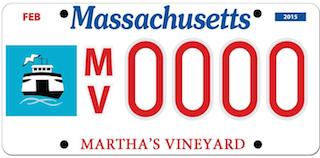There are many nautical-themed license plates out there. Maryland has “Treasure the Chesapeake, ”Rhode Island promotes the Plum Beach lighthouse, and Connecticut says it is “Home of the Amistad,” the slave ship where captives staged a famous mutiny in 1839.
Massachusetts will soon launch a new vanity plate, and it has nothing to do with the Red Sox, Celtics, Bruins or Patriots. Motorists in the Bay State will be able to chose to align themselves with the beautiful island of Martha’s Vineyard by sporting a specialty license plate with a rendering of the Steamship Authority ferry that has been the island’s link to the mainland since 1960.
The design features a drawing of the ferry on the ocean with a gull hovering above. This is certainly an iconic scene for anyone who has made the seven-mile crossing from mainland Cape Cod to “The Vineyard” on a Steamship Authority vessel.
“The Steamship is a common denominator and a part of just about everyone’s Vineyard experience,”Gwyn McAllister, a freelance journalist and copywriter who created the design, told the Vineyard Gazette. “Every car here came on the ferry at some point, so I thought it was an appropriate symbol for a license plate.”
Part of the $40 registration fee will benefit non-profit groups on the island. The plate can be pre-ordered, and once 1,500 orders are received, the Massachusetts DMV will begin production.
Massachusetts has another ship-themed commemorative plate ready to roll. This one will mark the 400th anniversary of the arrival of the Mayflower in Plymouth in 1620. It shows a blue silhouette of the ship arriving as a Wampanoag Native American looks on. The 400th anniversary is in 2020.
I did a quick bit of research and couldn’t find any other state that features a ferry service on its license plate. Perhaps this is a new trend.
Maybe one day we’ll see Florida offer a vanity plate marking the resumption of ferry service between the U.S. and Cuba. As part of U.S. efforts to improve relations with the island, President Obama recently granted licenses for ferry services, which were suspended in the 1950s as part of the U.S. trade embargo after Fidel Castro’s Communist revolution.




